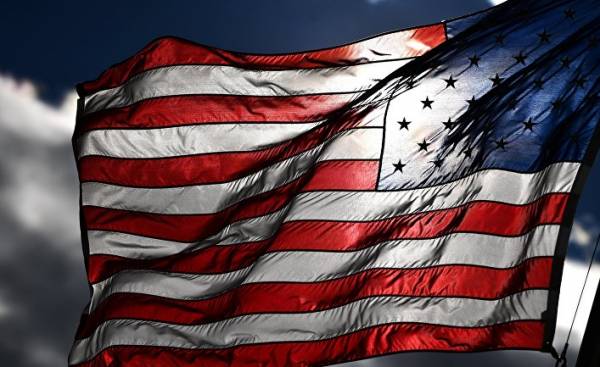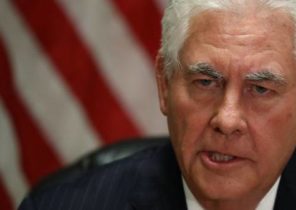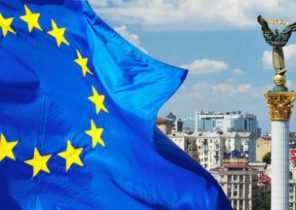
In the past decade there have been significant changes in the global economy, as many countries struggled with recession and its aftermath. While the United States and other fairly wealthy countries of the West slowly recover from the crisis, economic growth is worse than China, India and other emerging economies. However, in a world still dominated by the view that the United States is a major world economic power.
The Pew research center conducted a survey in 38 countries, which showed that, on average, 42% of respondents called the world-leading U.S. economy and 32% of China. In all the surveyed countries in Latin America and in most Asian countries and African countries South of the Sahara, the company believes the US economy is number one. Among Americans 51% in the first place puts their own country and 35% in China.
But seven out of 10 surveyed EU countries are considered leading economic power in the world of China (in Italy it’s even up). This opinion is shared by most of the respondents in Russia. A longtime ally of the USA and Australia in the ratio of two to one believe the leader of China, not America. Perhaps this is because Beijing is a major trading partner of Canberra, far ahead of all the others.
Over the past year, perceptions of the economic power of the USA has changed for the worse in many key trading partners and allies of America. The trend observed in several European countries, where opinions about the correlation of economic power in recent years are staggering. After the financial crisis 10 years ago Europeans often called a leading economic power in the world China, not America. But in recent years when the U.S. economy began to slowly recover, the pendulum has swung back in the direction of the United States. However, this year the pendulum of public performances returned to its original position, and countries such as Germany, Britain and Spain again believe China’s economy number one. But these changes are observed not only in Europe. Ideas about economic power, fundamental changes are underway in countries such as Canada, Brazil, Mexico and the Philippines.
But today, China and the United States had one thing in common: much of the world negative view of leaders of both countries. On average, 53% of respondents say they do not trust the policy of the Chinese leader XI Jinping in world Affairs. But much more than those (74%) who know or do not trust the President of the United States Donald Trump. Si is less known in the outside world than trump: about one in five has no opinion about the Chinese leader, while opinion of trump is missing on average, 8% of respondents.
Russian President Vladimir Putin gets a little more negative grades than C (don’t trust 59%). German Chancellor Angela Merkel became the only world leader, who had finally received a positive evaluation. 42% trust this veteran of German politics, while 31% do not feel confidence in it.
In General, the world community expresses a positive opinion about China. On average, 47% of respondents from 38 countries hold favorable views on the country, and 37% assessed it negatively. The popularity ratings of the US, fell sharply in the first year of the reign of trump, look similar. On average, 49% see America in a positive light, while 39% treat it negatively.
By region, China gets the highest marks in African countries South of the Sahara, where he in recent years is investing heavily. China positively evaluated 72% of Nigerians, and this is the highest rate in the study. Second place goes to Russia, in which China is positive about seven out of ten people (70%).
The Europeans have a different perspective on China, but the share of those who evaluate the country positively in some countries has increased significantly, including in Spain, France and Britain. In some large Asian countries, public opinion went in the opposite direction, and particularly a sharp decline in positive ratings has been observed in South Korea. It is also significant in Indonesia, India and Vietnam.
There is one question in which America looks much better estimates of global public opinion than China. It is a question of individual freedom. Among the respondents surveyed countries, on average, 54% said that in their opinion, the U.S. government respects the personal freedoms of its citizens. About China say that only 25% of respondents.
These are the main important conclusions of the new sociological research center Pew conducted among 41 953 respondents from 38 countries from 16 February to 8 March 2017.
The international image of China
On average, 47% of respondents from 38 countries hold favorable opinions about China, and 37% speak negatively about him. Absolute or relative majority in 24 countries give China a positive rating.
The most favorable opinion of China has developed in the African countries South of the Sahara, where he in recent years has made significant investment in infrastructure and in construction. In Nigeria, Senegal and Tanzania the positive opinions outweigh the negative by more than 40%. In Ghana China appreciate 49% 31% decrease compared to the spring of 2015. This is partly due to tensions arising between the two countries on the issue of mining.
If we talk about Latin America, the positive opinion of China has developed in Peru. Positively this Asian economic giant estimates about half of the respondents in Brazil, Venezuela and Chile.
The Russians also have a positive attitude toward China. Favorable opinion of the neighbor had 70% of the respondents. I must say that Russia took the second place on the positive assessment of China after Nigeria.
In Canada and the U.S. view of China is ambiguous. Canadians in General are sympathetic to this country, and among them the ratio of positive and negative assessments is 48% and 40%. Americans have the same ratio of opposite (47% say China has a negative and 44% positive). Americans ‘ opinions about China slightly improved after 2016, when 55% of respondents have a negative attitude to this Asian nation. In the US there are serious inter-party differences in relation to China. Among Republicans negative attitude to China, 56%, and among Democrats 41%.
In the Asia-Pacific region opinions differ. The most positive attitude towards China in Australia (64%) and the least in Vietnam (10%). In Australia over the past year positive attitude towards China increased by 12% (to the US decreased by 12%). But in Vietnam, the friendly attitude to China has declined over the last two years by 9% and Indonesia 8%.
The decline of positive evaluations of China’s most notable in South Korea, where the spring of 2015 it amounted to 27%, and now the figure is near a historic low.
In addition, the rankings of China’s slowly declining in most countries surveyed in Asia. For example, if in 2002 your neighbor were positive 55% of the Japanese people, now this figure is only 13%, although after the earthquake and tsunami of 2011, the attitude towards China has improved somewhat.
In some surveyed countries, the youngest generation of adults benevolence refers to China than older people. The biggest difference of opinion on China between the young and old people discovered in the UK, where positive attitude to China, 62% of young Brits (18 to 29 years), and among those over fifty, these people are only 38%. Other countries have similar laws. The difference in relation to the PRC between these age groups is 20% in Australia, 17% in Canada, 16% in Russia, 16% in the Netherlands, 16% in France and 15% in the US.
Negative ratings of the President si
If the image of China in the world are mostly positive, the same cannot be said about its leader, Chairman of the XI Jinping. On average, 53% of respondents say they do not trust the policy of the Chinese leader XI in world Affairs. The credibility of experience 28% of respondents.
Only in five countries, more than half of the respondents expressed their confidence in XI Jinping. Three of them are countries in sub-Saharan Africa, such as Tanzania, Nigeria and Senegal. The Chinese leader also received high ratings in Russia and the Philippines where opinion of him has not changed since then, as the Philippine President in 2016, was Rodrigo Duterte.
In the United States, as well as in the surveyed countries of Europe to si are generally negative. He also received low scores in neighboring Japan and Vietnam.
In a number of countries from different regions, a large percentage of respondents did not have any opinion about si. “Don’t know” — the answer most common among respondents from India, Tunisia, Poland, Hungary, Argentina, Indonesia and Senegal.
China and human rights
On average, 58% of respondents from 38 countries believe that the Chinese state did not respect the personal rights and freedoms of its citizens.
Especially common is the view in Europe, USA and Canada. Approximately 80 percent or more of Swedes, French, Germans, Dutch, Americans and Canadians say that China does not observe the personal rights and freedoms of its citizens.
But the view of China as a violator of civil liberties vary from region to region. More than half of respondents from middle East and African countries South of the Sahara (55% and 53%) believe that China respects the personal freedom of its population. The difference in the estimates with the West is very sharp.
The view of China as the defender of the rights of its citizens is particularly strong in African countries South of the Sahara. Everywhere, except in South Africa, half or more of respondents saying that Beijing respects the personal freedoms of its people. In South Africa this according to a relative majority (46%).
Among China’s neighbors opinions on this subject differ. The majority of Indonesians (56%) and about half of Filipinos (52%) say that China respects the personal freedom of its citizens. Meanwhile, negative opinions on this account adheres to the vast majority of Japanese (85%), Australians (81%) and South Koreans (77%). This is approximately the same as in Europe and North America.
Opinion on this issue is characterized by relatively constant in most countries, and here in the Philippines, in Jordan and in Russia in recent years it is changing. The view of China as the defender of personal freedoms in 2014 has increased significantly in the Philippines. In addition, for the first time since the inclusion of the question in the questionnaire in 2008, the majority of respondents in Russia (56%) and Jordan (55%) said that the Chinese government respects the personal rights and freedoms of its citizens. It should be noted that XI Jinping has made great efforts to improve relations with these countries.
In General, America is still considered the leading economic power in the world, but its separation from China reduced
Respondents were asked which country is the leading economic powers: USA, China, EU or Japan. In 24 of the 38 countries most consider the United States a global economic leader.
In 12 countries of the world economy number one was named the China. This is two times more than in the period from 2014 to 2016, when this question was asked last time.
Among 38 countries surveyed in South Korea is often a leading economic power called the United States (66%). Behind it with small backlog there is Japan (62%). In Israel about half of the respondents (52%) called America a world economic leader. In Viet Nam, said that 51%, and in Hungary and in the United States the same.
In other countries in the Asia-Pacific region opinions about leading economies of the world were strongly in favour of the United States. A relative majority of Filipinos (49%), Indians (42%) and Indonesians (39%) described the United States as the leading economic power.
In Western Europe people often say that a global economic leader is China, not America. For example, the economy is the number one China calls a relative majority in Spain (48%), France (47%), UK (46%) and Germany (41%).
The Australians all the more convinced that China became the leading economic power, this opinion is shared by 58% of citizens of this country. So think a relative majority in Canada (42%) and Russia (35%).
In General, few people consider to the global economic leaders of the EU and Japan. In Germany a quarter of respondents believe a leader of a country of the European Union.
In 2017, an average of 42% of respondents from 38 countries named the leading economy in the USA, 32% China 9% EU, and 7% to Japan. Since the previous poll on this topic fewer people are called the world’s economic leader, the United States, but more think number one China and the European Union.
In Europe, China in particular were more likely to call leading economy in the world. Prior to the recession in five European countries, people often called economic leader, the United States, but after the crisis, the five States believes the economy is the number one China.
In recent years, when the us economy started to gain momentum, and the Chinese a bit slowed down in Europe, the United States again began to consider the world’s leading economies. But since last year the balance of opinion has again shifted in favor of China, and now most Europeans include China among the world’s economic leaders.
In recent years, the sharp decline in opinions about the United States as the economic leader in Africa and Latin America. For example, in Tanzania in 2015, 63% said that America is the number one economy, and today it is saying 43%. A similar decrease was noted in Senegal (-20%) and in Ghana (-16%). Serious indicators of the decline in Mexico (down 13%), Chile (-12%) and Brazil (-12%), although in these countries the majority still believe the United States is the leading economy in the world.
In the Philippines, only 49% described the United States as a world economic leader, although in 2015, so consider 66%. But now China in this country called the economy number one is only a quarter of respondents. And in Britain in 2017, the United States called economic leader 31% of respondents, while a year earlier this view was held by 43%.
But in South Korea compared to the year 2015 the number of people who believe the United States is the leading economic power.







